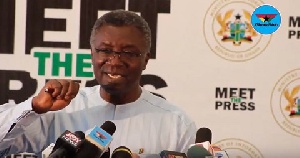Dr. Robert Bright Mawuko Sogbadji, Deputy Director, Nuclear and Alternative Energy on Friday said it is about time Ghana adapts the use of Nuclear power since it is safe and affordable.
“The reason to opt for the Nuclear option is that it helps to deepen the diversification of the present generation mix, reduce the national greenhouse emissions, reduce detrimental environmental impact, as well as reliable and cost-effective enough to serve as the base load”.
Dr Sogbadji said this in a presentation in Accra at boot camp organised by State Atomic Energy Corporation Rosatom on Nuclear Energy and Benefits of nuclear science and technologies development for Ghana.
Dr Sogbadzi said, it has become more necessary for Ghana to be interested in the nuclear power because currently there were energy generation deficit in Africa, adding that, there was also a need for high base load for industrialization.
He noted that nuclear energy was vital for the country’s economic development since it provided stable cost of power and gave energy security.
He said South Africa, had two nuclear plants and Egypt was currently establishing four units of 1200 megawatts each costing about $20 billion to boost their industry power supplies.
“We are looking at energy demands for the future, we have considered renewables, we have considered thermal and we are considering nuclear power plants, because we will be doing one district one factory and industry always operate on cheap power and if you don't have cheap power, industries, will move to a place where there is cheap power, like the way we have in China. Industry moved from Europe to China and China was able to grow," Dr Sogbazi said.
He disclosed that the country had started process to implement a nuclear policy by 2023.
He noted that, a timely implementation of the nuclear policy, would go a long way to fulfil the country’s quest to provide secure, reliable and clean energy for sustainable national development and to also achieve the vision of being a net exporter of electricity to sub-region.
Dmitri Shornikov, Chief Executive Officer at Rosatom Central and Southern Africa, noted that after more than five decades, Ghana is getting ready to become third African country that generates its electricity from nuclear power.
“Nuclear provides the world with clean, safe, affordable energy and innovations. I am proud to say that in fact nuclear contributes substantially to the sustainable development of society: it improves people’s lives, creates new opportunities and protects the environment,” he said.
Shornikov said countries like South Africa who have adapted the, nuclear policy had 7 per cent of the country's grid generated from nuclear energy and had resulted in relatively cheap power for both domestic consumers and industries compared to Ghana and most countries on the continent.
He noted that there are about 450 nuclear plants in the world in about 30 countries, which generated 11 per cent of the world's electricity and advised Ghana worked aggressively to make its nuclear policy a reality.
Business News of Saturday, 7 July 2018
Source: ghananewsagency.org













